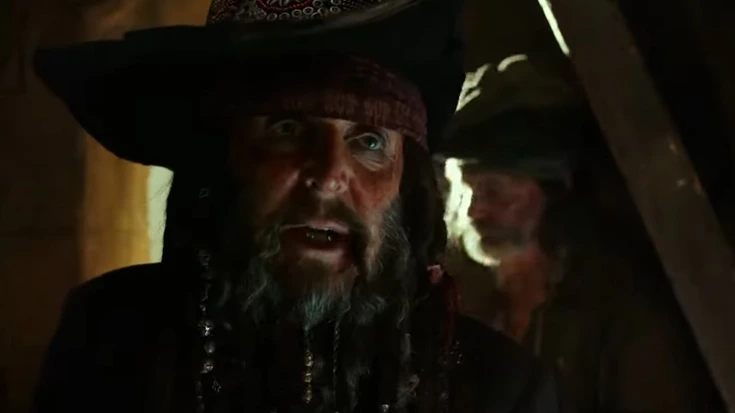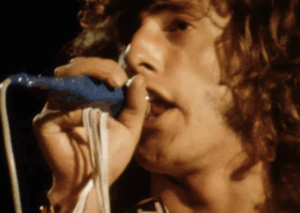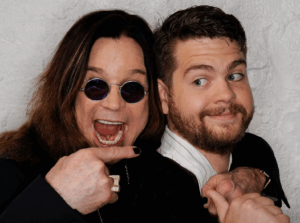10 Rock Star Cameos That Didn’t Work Out

via @elid6746 / YouTube
There’s something about seeing a rock star pop up unexpectedly in a film that feels like it should be cool—but rarely ever is. The promise of an edgy, rebellious energy often gets lost somewhere between the script and the camera lens, leaving behind an awkward, sometimes cringeworthy moment that makes you wonder who thought it was a good idea in the first place. What starts as a playful wink to fans often ends up as a scene-stealing detour for all the wrong reasons.
Plenty of musicians have successfully crossed into film, but cameos are a different beast. They’re quick, they’re flashy, and when they go wrong, they can derail the mood of a scene or even an entire movie. Whether it’s poor acting, an out-of-place presence, or a misguided attempt at humor, these appearances can feel more like distractions than clever Easter eggs. It’s not always about how famous the rocker is—it’s about how unnecessary the moment becomes.
In this list, we take a look at ten rock star cameos that missed the mark. From baffling performances that left audiences confused to blink-and-you’ll-regret-you-didn’t-miss-it roles, these are the moments that remind us not all icons belong on the big screen—at least not like this.
10. David Bowie on Zoolander
David Bowie’s surprise appearance in Zoolander should have been a moment of playful brilliance. After all, if anyone could glide into a satirical fashion showdown with gravitas, it’s the Thin White Duke himself. But the result was a hollow exercise in celebrity cameo-making—one that added nothing to the scene beyond name recognition. It felt more like a flex from Ben Stiller than a creative decision, reducing Bowie’s legacy to a punchline.
The cameo is over in a flash, and while Bowie delivers his lines with enthusiasm, there’s a sense that he’s been air-dropped in without context. He doesn’t interact meaningfully with the plot, nor does the film leverage his presence in any meaningful way. The fact that Zoolander wastes Bowie—a man who proved his acting chops in The Man Who Fell to Earth and The Last Temptation of Christ—only makes it more painful to watch.
Ultimately, Bowie’s involvement feels less like a collaboration and more like a party trick. It’s as if the movie said, “Look what we pulled off,” instead of actually earning his presence. Fans were left with the fleeting thrill of recognition, followed by the awkward realization that the scene didn’t need him—and that he didn’t need it either.
9. Ed Sheeran on Yesterday
Ed Sheeran’s cameo in Yesterday manages to be self-aware and still completely misjudged. In a film where The Beatles never existed, Sheeran becomes the world’s biggest songwriter—a joke that might’ve landed better if it wasn’t so uncomfortably close to how the industry already treats him. His performance is meant to parody his own fame, but instead it reinforces every criticism that’s been leveled at his bland musical persona.
As an actor, Sheeran makes you long for the days of silent cinema. His delivery is stiff, his timing is off, and every scene he’s in loses momentum. There’s a particular irony in watching a musician with such derivative output play himself in a movie that depends entirely on the genius of The Beatles. It’s like casting margarine in a biopic about butter.
Still, it’s not the most offensive cameo on this list—mostly because Yesterday itself leans into absurdity. The film knows it’s being cheeky, and Sheeran’s presence is part of the joke. But just because the joke is intentional doesn’t mean it’s funny, and his performance becomes more of a footnote than a feature. He’s lucky to land this low on the list.
8. John Bonham on Son of Dracula
John Bonham’s appearance in Son of Dracula is less of a cameo and more of a background fixture. As the drummer in a band performing onstage, he does exactly what you’d expect: he plays the drums. There’s no dialogue, no dramatic moment, just Bonham doing Bonham things while chaos unfolds around him. And while that’s technically fine, it also begs the question—why is he here at all?
The film itself is a trainwreck of clashing tones and squandered potential. Despite being stacked with rock talent like Ringo Starr and Harry Nilsson, it fails to justify its existence as either a narrative or a novelty. Bonham’s cameo, though harmless, ends up being symbolic of the film’s larger problems: it throws rock legends on screen without knowing what to do with them.
Bonham escapes the worst of this list’s fate simply because he doesn’t try to act. But that doesn’t excuse the empty gesture. His presence feels more like a checklist item than a creative choice, and for fans hoping to see him in a different light, Son of Dracula offers nothing but shadows.
7. Ozzy Osbourne on Trick or Treat
Ozzy Osbourne’s cameo in Trick or Treat feels like a bad fever dream stretched into celluloid. Credited with a “special appearance,” Ozzy stumbles through his scenes with a slurred mumble that might pass for satire if it weren’t so embarrassingly unwatchable. His presence is meant to be a jab at televangelists, but it lands with all the subtlety of a collapsing amp stack.
Ozzy has never claimed to be a serious actor, but the film mistakenly assumes that his wild persona alone is enough to carry the scene. Instead, what we get is a disjointed performance that borders on incoherent, undermining whatever faint narrative momentum the film has. It’s a reminder that charisma on stage doesn’t always translate to screen presence, especially when the direction seems content to let Ozzy ramble without purpose.
There’s a certain irony in watching a figure once feared by middle America try to play a straight-laced media critic. The concept might have worked with a better script—or at the very least, a clearer enunciation. Instead, Osbourne’s cameo feels like a missed opportunity wrapped in a joke that never lands. If anything, it adds to the long list of things he should have left alone after Blizzard of Ozz.
6. Bruce Dickinson on Chemical Wedding
Bruce Dickinson’s foray into film via Chemical Wedding is a strange experiment gone very wrong. Co-writing a film about Aleister Crowley might sound like an intriguing rock ‘n’ roll endeavor, but the execution is muddled, overwrought, and tone-deaf. The Iron Maiden frontman’s creative vision quickly spirals into an incoherent mess, and the film ends up being less about Crowley and more about trying—and failing—to look edgy.
It’s not just that the story lacks structure; it’s that everything feels forced, from the pseudo-intellectual babble to the garish attempts at occult imagery. Dickinson’s musical legacy is built on bombast, but the same theatrics that work on a concert stage crumble under cinematic scrutiny. The film takes itself too seriously to be camp and too ridiculous to be taken seriously—an unfortunate middle ground where bad cameos thrive.
While Dickinson doesn’t appear in a major acting role, his fingerprints are all over the film’s tone and direction, which earns him a place on this list. Chemical Wedding is proof that musical talent doesn’t automatically translate to narrative storytelling. If anything, it leaves you wondering if Dickinson should’ve stuck to piloting planes instead of plotting movies.
5. Adam Lambert on Bohemian Rhapsody
Adam Lambert has more than earned his spot as the modern-day frontman of Queen. His powerful vocals and theatrical presence allowed Brian May and Roger Taylor to keep the band’s legacy alive without it feeling like a hollow tribute act. While the idea of Queen without Freddie Mercury once felt sacrilegious, Lambert brought sincerity and showmanship to the role, proving that the songs could still soar on stage.
But Lambert’s brief appearance in Bohemian Rhapsody was unnecessary at best, confusing at worst. Playing a truck stop stranger with ambiguous interest in Freddie, the cameo felt like an awkward wink to the audience. The problem wasn’t that Lambert appeared—it was that the moment lacked any real weight or purpose, and ended up blending into the movie’s already chaotic tone.
Given Queen’s involvement in the production, one might expect Lambert’s inclusion to be meaningful. Instead, it was more of an Easter egg that didn’t crack open to reveal anything special. While his musical contributions to Queen are commendable, his acting debut in this film should probably remain a footnote rather than a feature.
4. Flea on Baby Driver
Flea may be a masterful bassist, but when it comes to acting, his track record is less than impressive. Despite his frequent dabbling in film and television over the years, including cult favorites like The Big Lebowski, his performances rarely rise above forgettable. His cameo as a minor criminal in Baby Driver is yet another example of a director giving him the benefit of the doubt—and getting little in return.
Baby Driver is a stylistic masterclass when it comes to visuals and music integration, but its ensemble cast needs to be tight for the film’s momentum to work. Unfortunately, Flea’s role does little to contribute to the slick choreography or narrative weight. He’s just… there. Neither threatening nor memorable, his character could’ve been played by nearly anyone without changing a thing.
What’s frustrating is that Flea’s screen presence has potential—his eccentric look and unpredictable energy might suit certain roles. But in Baby Driver, where precision is everything, his performance just drags. He doesn’t derail the film, but he doesn’t elevate it either, and for a movie that thrives on rhythm, his timing was off.
3. Phil Collins on Hook
Phil Collins might be one of the most talented musicians of his era, but his cameo in Hook proves that musical genius doesn’t always extend to the big screen. His brief role as a police inspector might not be the most offensive on this list, but it’s still jarringly out of place in a movie that’s already teetering between whimsy and chaos. Collins tries to inject charm into a stiffly scripted scene, but ends up fading into the background.
The real shame is that Hook featured a cast brimming with heavy hitters: Dustin Hoffman, Robin Williams, and Maggie Smith all tried valiantly to hold the movie together. Collins, meanwhile, shows up for a blink-and-you-miss-it moment that adds little to the story or the atmosphere. It feels like a personal favor more than a creative decision—one that doesn’t hold up under scrutiny.
For a man who once dominated both the music charts and the airwaves, Collins’ presence in Hook is surprisingly lifeless. It’s not that he’s awful—it’s that he doesn’t need to be there. When your film already feels bloated, a cameo without meaning just adds to the excess.
2. Mick Jagger on Bent
Mick Jagger has always flirted with the idea of being more than a rock star, dabbling in everything from fashion to film. His appearance in Bent, a drama about gay men persecuted during the Holocaust, is one of his most ambitious attempts at acting. Dressed in drag and singing cabaret, Jagger’s cameo was clearly intended to shock and provoke—but it ends up feeling calculated rather than heartfelt.
While the film itself tries to explore serious and devastating themes, Jagger’s moment feels performative. It’s not that he sings poorly—he doesn’t—but there’s something hollow about the way the scene plays out. Instead of enhancing the gravity of the film, it distracts from it, making you wonder whether the scene was designed for artistic expression or just for buzz.
It’s a shame, because Jagger has proven he can act when the material is right, as seen in The Burnt Orange Heresy. But Bent wasn’t the right stage for his theatrics, and the result is an awkward clash of tones. For a man who built a career on knowing how to steal the spotlight, this cameo is one instance where it might’ve been better if he’d stayed in the wings.
1. Paul McCartney on Pirates of The Caribbean: Dead Men Tell No Tales
Paul McCartney’s legacy as a Beatle is beyond reproach, but his track record in film? Not so much. From the lukewarm reception of Give My Regards to Broad Street to his forgettable contributions to Beatles’ cinematic projects, McCartney has never quite clicked as an actor. That trend continued when he inexplicably showed up in the Pirates of the Caribbean franchise, dressed like Jack Sparrow’s uncle and spouting pirate clichés.
The scene is excruciatingly forced, feeling more like a deleted Saturday Night Live sketch than a part of an already tired blockbuster. McCartney grins through his lines like he’s in on the joke, but the audience is left cringing rather than laughing. The franchise had long since lost its magic, and this cameo was the final nail in the coffin for both the movie and the rocker’s on-screen ambitions.
There’s something tragically fitting about McCartney ending up in a sinking cinematic ship. For a man whose every note changed the course of music history, his acting career remains an odd, stumbling side quest. Let’s just hope this was the final curtain call for Paul’s pirate phase—and that no one brings it back from the dead.






















